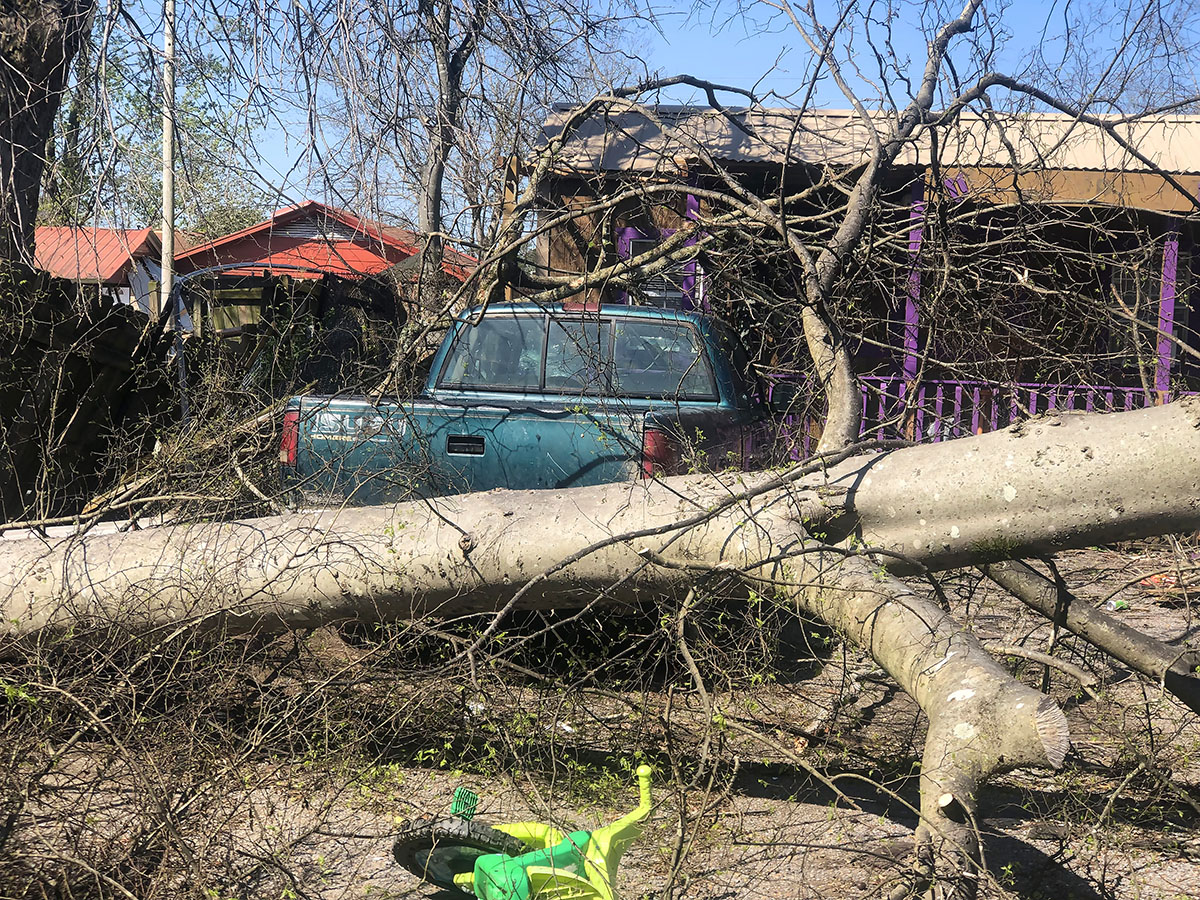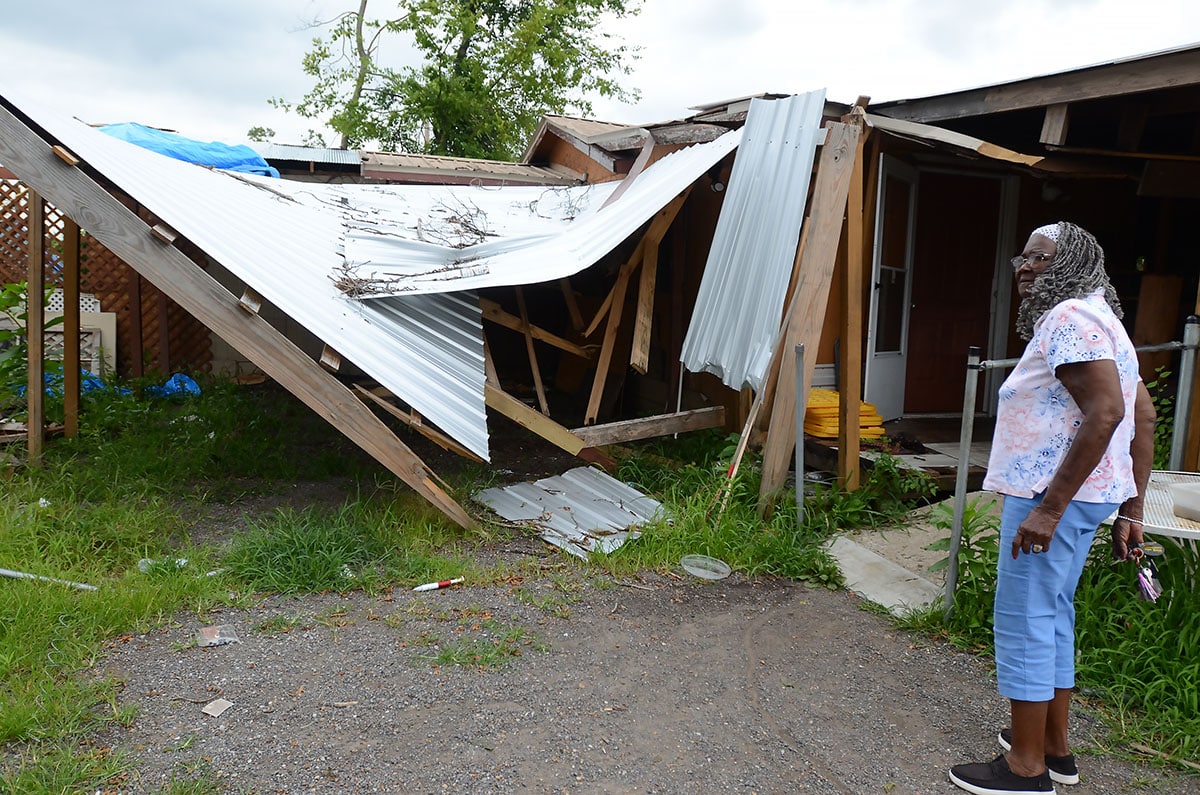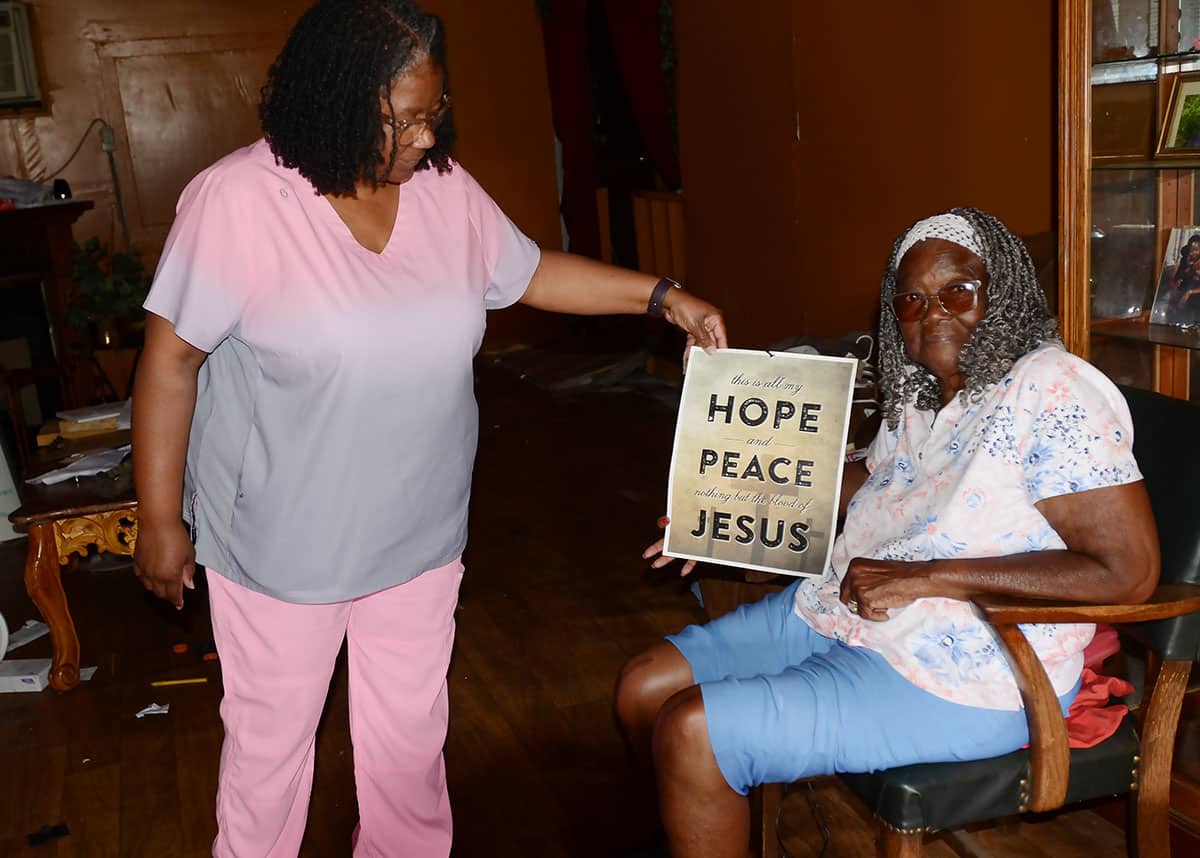Mississippi Today
For disaster victims trying to rebuild their lives, their last hope: volunteer groups

A day that began with clear, blue skies for LeeOtis Hubbard Gladney ended with destruction during nightfall, when a March 24 tornado swept through Amory.
A nightmare followed the terror of that night as Gladney soon realized her path to recovery would not be easy. After experiencing insufficient help from her insurance company, and little from the federal government, she became one of thousands who have relied on volunteer assistance to recover from a disaster.
The night of the storm, Gladney sat in her brown recliner listening to the weather forecaster track the storm. She assumed the tornado would not cause substantial damage to Amory based on past times when the tornado did not touch down.
But once the forecaster started praying for Amory, reality sunk in. Gladney’s granddaughter called, asking if Gladney could make it to her house. Then the power went out.
Gladney, who had knee surgery just a week before, struggled to move to find shelter in her home.
Soon her grandson, Rafael, rushed into the house and assisted her, along with her cane, behind a couch. He placed her on the floor and threw a mattress off a bed to cover Gladney, her husband and her younger son, Leonard.
A couple of minutes after Rafael left to protect his own family, sirens blared, high winds roared outside, and the carport’s tin roof in the backyard began to crumble. Leonard gripped Gladney’s hand for comfort as an unsettling atmosphere lingered over the family.
“After a while, it was all over,” Gladney said as her voice trailed off. “It was all over.”
Residents are still in the process of rebuilding, 95 days after a series of deadly tornadoes and strong thunderstorms swept across Mississippi – killing at least 25 people and leaving a 100-mile trail of destruction.
Gladney is one of those residents in Amory.
The morning following the storm, her daughter, Tujuana Hampton, pleaded with Gladney to leave her home, but she refused. It took Hampton two days to get Gladney out of the house, insisting she could either walk or be carried.
“When we got outside, she turned and looked at the damage to her house. She almost passed out,” Hampton stated.
Two unrooted trees rested on top of Gladney’s home, parts of the ceiling were damaged, and the foundation of her home had shifted.

She said she found herself stuck with little to no assistance from FEMA and her insurer.
“FEMA told her since she has insurance and, if the company gave her over $40,000, then there was nothing they could do to help her. But $40,000 wouldn’t even cover half of what her house and yard (repairs) would cost,” Hampton told Mississippi Today.
FEMA spokesperson Mike Wade confirmed that if a survivor receives $41,000 from insurance, any further FEMA support is considered a duplication of assistance, which is not allowed.
FEMA’s Individual Assistance Program meets basic needs and supplements disaster recovery efforts, but it cannot replace insurance or compensate for all disaster losses. Therefore, the amount of financial assistance an individual or household may receive under FEMA’s Individuals and Households Program is limited.
Michael Richmond-Crum, the director of personal lines for the American Property Casualty Insurance Association, said insurance companies have a responsibility to their customers to act urgently for covered losses following a disaster. However, many states are facing a growing affordability and availability crisis in property insurance markets.
“2022 was the eighth consecutive year in a row that the U.S. suffered at least 10 catastrophes, causing more than a billion dollars in losses each. Natural disaster losses from 2020-2022 in the U.S. exceeded $275 billion in 2022 dollars, which is the highest ever three-year total for U.S. insurers,” Richmond-Crum told Mississippi Today.
Even in federally declared disaster areas like Amory, residents like Gladney are left to rely on volunteer organizations for help in recovering.
On March 27, Samaritan’s Purse, a North Carolina-based evangelical Christian relief organization, deployed one disaster relief unit to Rolling Fork and another to Amory to assist homeowners impacted by the destruction.
Through its mobile home replacement program, 38 families from Mississippi towns and surrounding areas have been approved as of June 7. Six mobile homes were delivered to the families two months after the tornado, and others are actively in the application process.
“A lot of the families we are helping are severely underinsured or don’t have the resources to get back into their house. They are still eligible to apply for the mobile home program,” Luther Harrison, vice president of North America Ministries, told Mississippi Today.
Partnering with local churches in the community, the organization was directed to residents in the neighborhoods that needed assistance. The organization tarped damaged roofs, cut up fallen trees, and cleared debris from yards.
“We know they lost most if not everything they had, and we’re just trying to show them Christ-like love as we go out into the community and help them,” Harrison said.
In Mississippi, Samaritan’s Purse was able to help 402 families with cleanup through the assistance of 1,145 volunteers that came out to serve.
Hubbard was one of them.
“The Samaritan’s Purse came and cleaned up the yard for her. People that we don’t know came and fed us and made sure we had water,” Hampton said.
Operation BBQ Relief, a Missouri nonprofit established in May 2011, has provided over 10 million meals throughout the United States and internationally following natural disasters. They have served close to 85,000 meals in Mississippi deployments.
During the organization’s deployment to Amory on March 26 – April 3, they provided the community with 4,355 meals to the town of about 6,360 people.
Heather Williams, the director of communications for Operation BBQ Relief, said the organization tries to relieve the burden and stress residents experience when uncertain of their next meal, as a result of the closure or damage to stores and restaurants.
“We want to provide one thing that they can count on when their life has been turned upside down: a hot meal,” Williams continued. “We value them.”
Head of Volunteer Services for Operation BBQ Relief Brian Polak said the organization fuels the residents both literally, with a hot meal, and figuratively, through a sense of community.
Providing disaster relief is “one of the hardest things volunteers will ever love doing,” Polak said. There’s a willingness to help others which is what gets volunteers involved, but it’s the experiences that keep them involved, he said.
The organization has over 18,000 volunteers nationwide.
“Volunteer agencies bring varied services to those in need, instead of those in need having to seek out the assistance, which can be difficult for a multitude of reasons during those first hours, days, or weeks,” Polak stated.
In Mississippi areas, where resources are already stretched thin after natural disasters, it is often difficult to contact someone who can help. And even when assistance is provided, it can be insufficient.

Gladney has been able to move into a temporary residence of her own, after leaving Hampton’s home – 83 days after the storm.
Gladney’s home is cleared on the outside, but it remains unlivable on the inside, she said. Even though she received assistance from volunteer organizations, she refused to let them clean inside her home because of her reliance on insurance.
“I’ve been hoping and praying for Alfa to come around and do me right,” Gladney said of her insurance company.
According to Gladney, Alfa Corp. won’t condemn the home – determine the home is no longer fit for human inhabitation – because insurance would have to pay for the estimated value to rebuild her home. Instead, it is stating the conditions of the house were “pre-existent,” Gladney said.
An Alfa Corp. spokesperson stated the claims department couldn’t comment on individual claims.
“Now, she’s stuck,” Hampton said. “Her whole life was in that house. And now, that’s it.”
This article first appeared on Mississippi Today and is republished here under a Creative Commons license.
Mississippi Today
On this day in 1909, Matthew Henson reached the North Pole
April 6, 1909

Matthew Henson reached the North Pole, planting the American flag. Traveling with the Admiral Peary Expedition, Henson reportedly reached the North Pole almost 45 minutes before Peary and the rest of the men.
“As I stood there on top of the world and I thought of the hundreds of men who had lost their lives in the effort to reach it, I felt profoundly grateful that I had the honor of representing my race,” he said.
While some would later dispute whether the expedition had actually reached the North Pole, Henson’s journey seems no less amazing.
Born in Maryland to sharecropping parents who survived attacks by the KKK, he grew up working, becoming a cabin boy and sailing around the world.
After returning, he became a salesman at a clothing store in Washington, D.C., where he waited on a customer named Robert Peary. Pearywas so impressed with Henson and his tales of the sea that he hired him as his personal valet.
Henson joined Peary on a trip to Nicaragua. Impressed with Henson’s seamanship, Peary made Henson his “first man” on the expeditions that followed to the Arctic. When the expedition returned, Peary drew praise from the world while Henson’s contributions were ignored.
Over time, his work came to be recognized. In 1937, he became the first African-American life member of The Explorers Club. Seven years later, he received the Peary Polar Expedition Medal and was received at the White House by President Truman and later President Eisenhower.
“There can be no vision to the (person) the horizon of whose vision is limited by the bounds of self,” he said. “But the great things of the world, the great accomplishments of the world, have been achieved by (people with) … high ideals and … great visions. The path is not easy, the climb is rugged and hard, but the glory at the end is worthwhile.”
Henson died in 1955, and his body was re-interred with full military honors at Arlington National Cemetery. The U.S. Postal Service featured him on a stamp, and the U.S. Navy named a Pathfinder class ship after him. In 2000, the National Geographic Society awarded him the Hubbard Medal.
This article first appeared on Mississippi Today and is republished here under a Creative Commons Attribution-NoDerivatives 4.0 International License.![]()
Mississippi Today
A win for press freedom: Judge dismisses Gov. Phil Bryant’s lawsuit against Mississippi Today
Madison County Circuit Court Judge Bradley Mills dismissed former Gov. Phil Bryant’s defamation lawsuit against Mississippi Today on Friday, ending a nearly two-year case that became a beacon in the fight for American press freedom.
For the past 22 months, we’ve vigorously defended our Pulitzer Prize-winning reporting and our characterizations of Bryant’s role in the Mississippi welfare scandal. We are grateful today that the court, after careful deliberation, dismissed the case.
The reporting speaks for itself. The truth speaks for itself.
This judgment is so much more than vindication for Mississippi Today — it’s a monumental victory for every single Mississippian. Journalism is a public good that all of us deserve and need. Too seldom does our state’s power structure offer taxpayers true government accountability, and Mississippians routinely learn about the actions of their public officials only because of journalism like ours. This reality is precisely why we launched our newsroom nine years ago, and it’s why we devoted so much energy and spent hundreds of thousands of dollars defending ourselves against this lawsuit. It was an existential threat to our organization that took time and resources away from our primary responsibilities — which is often the goal of these kinds of legal actions. But our fight was never just about us; it was about preserving the public’s sacred, constitutional right to critical information that journalists provide, just as our nation’s Founding Fathers intended.
Mississippi Today remains as committed as ever to deep investigative journalism and working to provide government accountability. We will never be afraid to reveal the actions of powerful leaders, even in the face of intimidation or the threat of litigation. And we will always stand up for Mississippians who deserve to know the truth, and our journalists will continue working to catalyze justice for people in this state who are otherwise cheated, overlooked, or ignored.
We appreciate your support, and we are honored to serve you with the high quality, public service journalism you’ve come to expect from Mississippi Today.
READ MORE: Judge Bradley Mills’ order dismissing the case
READ MORE: Mississippi Today’s brief in support of motion to dismiss
This article first appeared on Mississippi Today and is republished here under a Creative Commons Attribution-NoDerivatives 4.0 International License.
Mississippi Today
Meet Willye B. White: A Mississippian we should all celebrate
In an interview years and years ago, the late Willye B. White told me in her warm, soothing Delta voice, “A dream without a plan is just a wish. As a young girl, I had a plan.”
She most definitely did have a plan. And she executed said plan, as we shall see.
And I know what many readers are thinking: “Who the heck was Willye B. White?” That, or: “Willye B. White, where have I heard that name before?”
Well, you might have driven an eight-mile, flat-as-a-pancake stretch of U.S. 49E, between Sidon and Greenwood, and seen the marker that says: “Willye B. White Memorial Highway.” Or you might have visited the Olympic Room at the Mississippi Sports Hall of Fame and seen where White was a five-time participant and two-time medalist in the Summer Olympics as a jumper and a sprinter.
If you don’t know who Willye B. White was, you should. Every Mississippian should. So pour yourself a cup of coffee or a glass of iced tea, follow along and prepare to be inspired.
Willye B. White was born on the last day of 1939 in Money, near Greenwood, and was raised by grandparents. As a child, she picked cotton to help feed her family. When she wasn’t picking cotton, she was running, really fast, and jumping, really high and really long distances.
She began competing in high school track and field meets at the age of 10. At age 11, she scored enough points in a high school meet to win the competition all by herself. At age 16, in 1956, she competed in the Summer Olympics at Melbourne, Australia.
Her plan then was simple. The Olympics, on the other side of the world, would take place in November. “I didn’t know much about the Olympics, but I knew that if I made the team and I went to the Olympics, I wouldn’t have to pick cotton that year. I was all for that.”
Just imagine. You are 16 years old, a high school sophomore, a poor Black girl. You are from Money, Mississippi, and you walk into the stadium at the Melbourne Cricket Grounds to compete before a crowd of more than 100,000 strangers nearly 10,000 miles from your home.
She competed in the long jump. She won the silver medal to become the first-ever American to win a medal in that event. And then she came home to segregated Mississippi, to little or no fanfare. This was the year after Emmett Till, a year younger than White, was brutally murdered just a short distance from where she lived.
“I used to sit in those cotton fields and watch the trains go by,” she once told an interviewer. “I knew they were going to some place different, some place into the hills and out of those cotton fields.”
Her grandfather had fought in France in World War I. “He told me about all the places he saw,” White said. “I always wanted to travel and see the places he talked about.”
Travel, she did. In the late 1950s there were two colleges that offered scholarships to young, Black female track and field athletes. One was Tuskegee in Alabama, the other was Tennessee State in Nashville. White chose Tennessee State, she said, “because it was the farthest away from those cotton fields.”
She was getting started on a track and field career that would take her, by her own count, to 150 different countries across the globe. She was the best female long jumper in the U.S. for two decades. She competed in Olympics in Melbourne, Rome, Tokyo, Mexico City and Munich. She would compete on more than 30 U.S. teams in international events. In 1999, Sports Illustrated named her one of the top 100 female athletes of the 20th century.
Chicago became White’s home for most of adulthood. This was long before Olympic athletes were rich, making millions in endorsements and appearance fees. She needed a job, so she became a nurse. Later on, she became an public health administrator as well as a coach. She created the Willye B. White Foundation to help needy children with health and after school care.
In 1982, at age 42, she returned to Mississippi to be inducted into the Mississippi Sports Hall of Fame and was welcomed back to a reception at the Governor’s Mansion by Gov. William Winter, who introduced her during induction ceremonies. Twenty-six years after she won the silver medal at Melbourne, she called being hosted and celebrated by the governor of her home state “the zenith of her career.”
Willye B. White died of pancreatic cancer in a Chicago hospital in 2007. While working on an obituary/column about her, I talked to the late, great Ralph Boston, the three-time Olympic long jump medalist from Laurel. They were Tennessee State and U.S. Olympic teammates. They shared a healthy respect from one another, and Boston clearly enjoyed talking about White.
At one point, Ralph asked me, “Did you know Willye B. had an even more famous high school classmate.”
No, I said, I did not.
“Ever heard of Morgan Freeman?” Ralph said, laughing.
Of course.
“I was with Morgan one time and I asked him if he ever ran track,” Ralph said, already chuckling about what would come next.
“Morgan said he did not run track in high school because he knew if he ran, he’d have to run against Willye B. White, and Morgan said he didn’t want to lose to a girl.”
This article first appeared on Mississippi Today and is republished here under a Creative Commons Attribution-NoDerivatives 4.0 International License.![]()
-

 Mississippi Today5 days ago
Mississippi Today5 days agoPharmacy benefit manager reform likely dead
-

 News from the South - Kentucky News Feed6 days ago
News from the South - Kentucky News Feed6 days agoTornado practically rips Bullitt County barn in half with man, several animals inside
-

 News from the South - Alabama News Feed5 days ago
News from the South - Alabama News Feed5 days ago'I think everybody's concerned': Mercedes-Benz plant eyeing impact of imported vehicle tariffs
-

 News from the South - Missouri News Feed7 days ago
News from the South - Missouri News Feed7 days agoThunderstorms drench areas south of St. Louis
-

 News from the South - Alabama News Feed6 days ago
News from the South - Alabama News Feed6 days ago41st annual Bloomin Festival Arts and Crafts Fair (April 5 & 6) | March 31, 2025 | News 19 at 9 a.m.
-

 News from the South - Florida News Feed4 days ago
News from the South - Florida News Feed4 days agoFlorida special election results: GOP keeps 2 U.S. House seats in Florida
-

 News from the South - Louisiana News Feed5 days ago
News from the South - Louisiana News Feed5 days agoMother turns son's tragedy into mental health mission
-

 News from the South - Kentucky News Feed4 days ago
News from the South - Kentucky News Feed4 days ago3 killed in fiery Lexington crash temporarily shuts down portion of New Circle Road














































